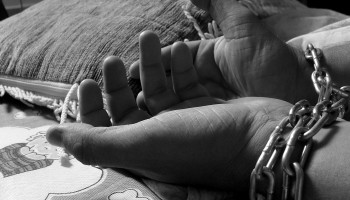Crime around the world generates trillions of dollars annually, Fedotov said at the start of the conference on Monday, and he encouraged joint global efforts in the fight against organized crime.
Around US$40 billion is lost to corruption annually in developing countries, while global human trafficking accounts for another US$32 billion. UNODC and the World Bank recently calculated these figures for the first time, based on 2009 data. According to Fedotov the criminal proceeds account for nearly 3.6 percent of world gross domestic product, earning those involved in it around US$2.1 trillion annually making crime one of world’s “top 20 economies.”
“Corruption has a disproportionate impact on poor communities and a corrosive effect on the fabric of societies across the globe,” Fedotov said on Tuesday.
He added that “It is vital that we encourage business to play their part in the fight against corruption and take action to promote integrity.”
“I urge business leaders and investors to buy a share in a better tomorrow by joining the Integrity Initial Public Offering and show their resolve to help create a fair and level playing field for everyone in business,” said Fedotov.
The IPO initiative grew out of the UN Convention against Corruption – the only universal anti-corruption legal instrument in the world, UNODC stated. The goal of the initiative is to improve anti-corruption laws and regulations and their implementation, and to improve the transparency, accountability and fairness of public procurement systems.
The World Economic Forum and other organizations also participated in the creation of the initiative.
Fedotov and the Secretary General at the UN World Tourism Organization (WTO) Taleb Rifai also pledged to end human trafficking in the tourism sector through joint efforts, after the Monday signing of a memorandum of understanding to boost cooperation in the fight against human trafficking.
"Today, our two organizations are conveying a strong message to the world that we will not be party to activities that exploit women and children," said Fedotov. He characterized human trafficking as "a shameful crime of modern-day slavery,” noting that the number of trafficking victim worldwide at any given time is around 2.4 million.
While tourism drives economic growth, it is sometimes tied to sexual and labor exploitation.
Fedotov said organized crime, trafficking, corruption and violence are "major impediments" to the fulfillment of the Millennium Development Goals, aimed at reducing poverty and improving health among the world’s poorest populations by 2015.
This year’s meeting revolves around violence against migrants, migrant workers and their families. Other issues include maritime piracy, treatment of prisoners, and civilian private security services. The conference will run until April 27.





